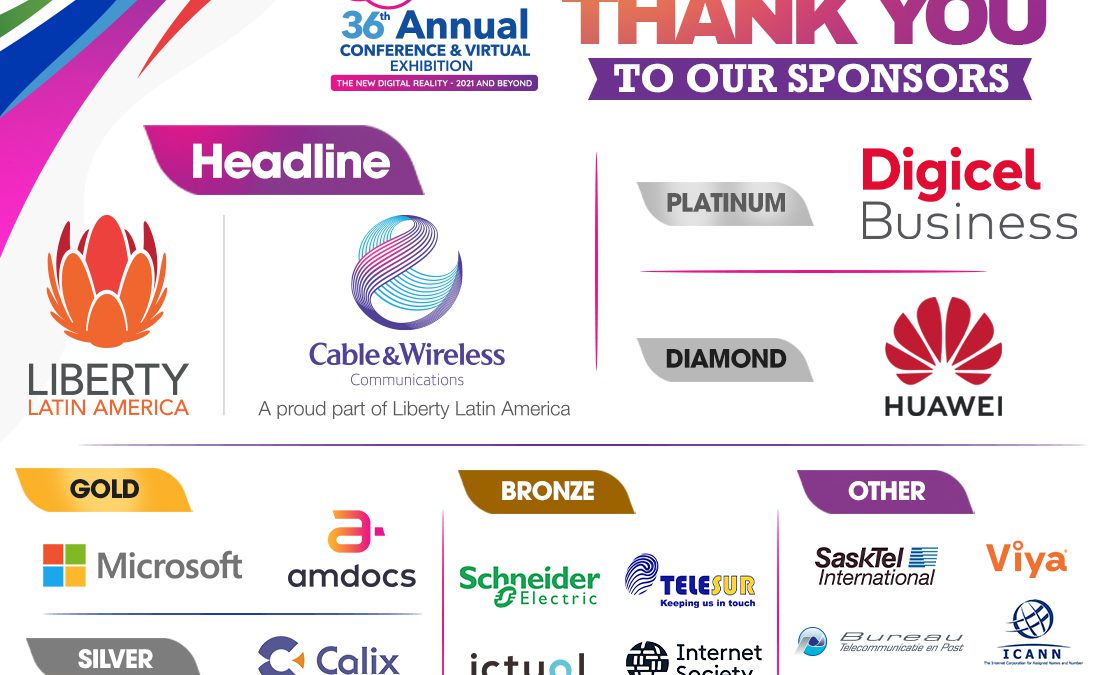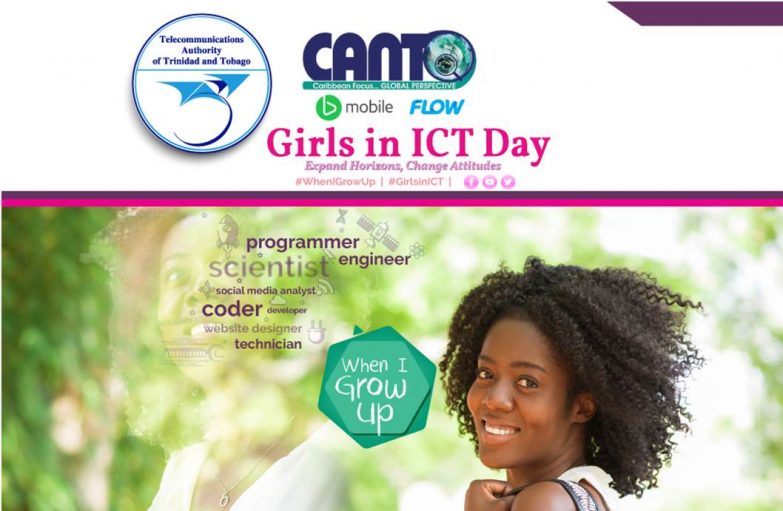CANTO’s 36th Annual Virtual Conference The New Digital Reality 2021 & Beyond- Day 2
Following the energizing start of CANTO’s 36th Annual Conference and Virtual Exhibition, day 2 yet again provided an action-packed agenda to keep the momentum at a steady pace.
Taking the spotlight as the first speaker on day 2, was Doreen Bogdan-Martin, Director of the Telecommunication Development Bureau of the International Telecommunication Union (ITU).
Doreen noted that the Caribbean Region was making steady and impressive ICT progress, highlighting CARICOM’s move towards a single ICT Zone as good one, referencing the ITUs ongoing collaborations with CARICOM and the CTU. She challenged the Region to extend its broadband reach.
Calling for new Regulation, innovative new partnerships and more holistic approaches, she also spoke of the need for more inclusiveness and updated financing models. Director Martin reminded attendees that 3.7 billion people have never been online or connectivity was either too slow, expensive or inaccessible. She shared information on the ITUs Partner2Connect Digital Coalition, a multi-stakeholder alliance building capacity towards meaningful connectivity and digital transformation in the hardest-to-connect communities, including Least Developed Countries, Landlocked Developing Countries, and Small Island Developing States, in an effort to achieve the 2030 targets of the Sustainable Development Goals.
She urged the Region to commit to working together to address the most urgent national and Regional ICT priorities, in particular to capitalise on tomorrow’s most exciting digital developments.
Continuing its reputation for driving conversation on key industry issues, the first panel for the day raised the importance of developing Successful Strategies for Regulating Big Tech in the Caribbean. Moderated by Philippe Defraigne, Director at Cullen International; the panel brought together academics and the independent Regulatory intelligence experience of Cullen International to drill down into the debate regarding the power of Big Tech giants such as Google, facebook, Apple, Amazon, Alibaba.
Panellist Alexandre de Streel, Professor of EU Law, University of Namur, Belgium comment during the discussion resonated well with his fellow panellists. Professor de Streel noted, “The party is over. Big Tech will no longer be left alone anymore”. Completing the panel were Michèle Ledger, Head of Media, Cullen International; Professor Anthony Clayton, Institute for Sustainable Development, The University of the West Indies (UWI), Jamaica; and David Geary, General Counsel, Digicel Group.
Ms Ledger provided an overview of the current UK and EU Regulatory legal measures being put in place to prohibit discriminatory conduct by tech giants while also tackling online harms. Harms in scope would revolve around such practices deemed illegal under EU or national laws or in breach of the platforms’ terms and conditions including fake news or content harmful to children. Michèle drew attention to the fact that previously in the EU, supervision of digital services was ineffective but was now moving towards an “ecosystem of oversight involving platforms” in particular the very large online platforms. Questions remain – “is there clear guidance of what is harmful or illegal, “how do laws balance freedom of expression concerns in relation to harmful content?
Professor de Streel spoke of laws to harness the power of big tech, such as moves towards structural separation whereby a platform such as Amazon, may not act as a marketplace while also promoting its own similar products or services. Tech giants may also be banned from using data collected from companies using their platforms to develop competing products.
UWI’s Professor Clayton cited the manipulation of social media by large terrorist organisations. Speaking about social media wars, he noted the evidence also pointed to political manipulation via social media platforms and messaging which encouraged division, thereby undermining democracy and the catastrophic consequences of such actions in the Caribbean.
Similar to Professor de Streel, Digicel’s David Geary posited that it is “goodbye wild west – the big tech free-for-all is over”. He spoke of the need for a harmonised approach and a modern anti-trust framework in the Caribbean. Geary highlighted the gains by Australia over big tech. He questioned whether providers get clear guidance in the Caribbean. He speculated that platforms should engage with Regulators and platform providers.
Next moves? The conversation continues…
Taking the conference to the lunch break on Day 2 was another thought-provoking panel discourse on the Contributions by the Digital Economy to the Caribbean. Panellists were Mtwalo Msoni, Global Tax Advisor, Action Aid, Nigeria; Bocar BA, CEO, SAMENA Telecommunications Council and Commissioner on the Broadband Commission; Jason Okerby, Founding Director, CEG Australia and Kieran Meskell, Head of Regulatory Affairs, Digicel Group. Moderator was Professor Gilbert Morris, economist.
Panellists recognised, with some reservations, the current efforts of the OECD to reform international taxation rules and ensure that multinational enterprises pay a fair share of tax wherever they operate, including digital companies which may operate in a country but have no physical presence there.
Kieran reminded the panel that in international decisions re: ITU and UN each CARICOM country has one vote so there is some measure of power.
Jason put forward Australia as an example of a ‘small’ country that has somewhat successfully taken on the might of the large platforms. Australia has developed a code of conduct of how platforms must operate with other companies eg payment by platforms to use news publishers content (through proposed Final Offer Arbitration).
Bringing another viewpoint Bocar acknowledged that “internet companies also bring value and the OECD’s plans could create an opening for new tax revenue to be re-cycled back into economies for digital infrastructure development.
Overall, again it was suggested that more fully co-ordinated and aligned systems were needed to optimise contributions from the ever-growing digital economy.
“The Telecoms Industry holds an ever more important position as the key enabler of innovation and convenience. The Industry’s enabling role has become very visible in multiple dimensions of the society’s progress toward digital development and digital inclusion; The Internet and “everything digital” have spurred demand for digital products and services across borders. The need to ensure sustainability of the industry and the nascent 5G digital ecosystem has brought together telecommunications service providers and various stakeholders along the digital value-chain to collectively investigate how the speed of change is affecting the pace of business transformation”. Bocar BA
Starting with dialogue on How 5G infrastructure can be rolled out in the Caribbean, were moderator Robert Taylor, Secretary General of the CTU; along with panellists Dr Mohamed Madkour – VP Global Wireless Marketing and Solutions, Huawei Technologies; Dr Bruno Soria, Nera Economic Consulting; Fabian Monge Muñoz, Head of Networks and Managed Sales, Ericsson; Tom Sullivan, Bureau Chief, Federal Communications Commission and Carlos Bosch, Head of Technology, GSMA. Points raised included:
5G is about how to get ready for 5G. 5G is about technology, commercial business, social and economic development. Those who adopt it want to be leaders on the ICT map. There must be a good soil of 4G before moving to 5G. Moving forward there must be openness and collaboration; future looking policy, growth-oriented policy; cross regulation, not just the regulation of telecoms. (Mohamed)
Telecoms operators need figures to add up. 5G poses challenges to Caribbean Telcos, yet it has the potential to improve the offerings of Caribbean Telcos such as widened capacity for mobile and IoT applications. (Bruno)
5G is a journey. There must be a robust 4G network. In the Caribbean there is about 40% penetration of4G. Evolution to 5G is needed. A 5G network has the potential to make enormous contributions to the industrial environment in the areas of energy, health, public services, auto, manufacturing, agriculture, media entertainment, retail, financial services, public safety and public transport. (Fabian)
ITU IMT 2020 presents demanding requirements for 5G technologies. 5G is an opportunity to create an agile purpose-built network tailored to the different needs of citizens and the economy. 5G will allow operators to move beyond connectivity or faster data speeds and collaborate across sectors. 5G offers opportunities in LDCs, LLDCs and SIDS. 5G is a needed upgrade. (Carlos)
As technology evolves so do the risks and threats to the digital environment especially if one considers that information on “how to hack” is readily available on the web. Hector Martinez of Schneider Electric brought into stark reality such threats as he spoke on Managing Cyber Risks and Driving Digital Innovation.
Martinez described 2020’s cyber risks as ransomware, phishing attacks and matters of the physical critical infrastructure. He stated that research showed that 70% of employees don’t understand cybersecurity and only 20% of budgets may be used for security. There is a “need to be ahead of the game”. “Cybersecurity defense demands a strong offense”. Cybersecurity supports safety for staff and the environment. Of major importance is the integration of people, process and technology as part of cybersecurity strategy.
The afternoon’s second panel opened the window on Digital Technology to Increase Resilience. Moderated by CANTO’s very versatile host, Wendell Etienne, the topic of resilience was showcased in presentations by Luis Vazquez, Executive Industry Solution Manager, Huawei; Dulip Tillekeratne, Climate Tech, GSMA; and Tom Duggan, Market Engagement Manager, GSMA. Issues highlighted were:
Luis: Building a Sustainable Network – The 4th Industrial Revolution has accelerated market entry into the intelligent world, where smart energy technologies may create a greener world. The US/EU has set a target on carbon neutral emissions by 2050. Renewable energy is a growing option. Huawei’s technology has already allowed for solar panels on towers.
Dulip: How Technology can be used for preparedness/response and long-term adaptation to climate hazards – At the GSMA, the Climate technology programme unlocks the power of digital technology in low and middle income countries towards a low carbon and climate resilient future. The GSMA notes that climate change has intensified climate hazards which calls for a robust Business Continuity Plan. Dulip spoke about the BRACED programme, which is funded by UK Aid, defines climate resilience and adaptions by the 3As:
Adaptive capacity – ability to preserve the network
Anticipatory capacity – utilising technology for resilience
Absorptive capacity – humanitarian connectivity
Tom: Renewable Energy for Mobile Towers – Almost dovetailing with Luis’s presentation, Tom spoke on the GSMA’s thrust to power mobile towers in low and middle-income countries with renewable energy. He gave insight into the main barriers and challenges preventing their adoption in targeted countries.
Rounding off Day 2, Former CANTO Chairman, Julian Wilkins engaged the Honourable E. Jay Saunders, Deputy Premier, Turks and Caicos Islands who also holds the position of Minister of Minister of Health and Human Services in a fireside chat. Deputy Premier Saunders gave updated attendees on the current status of the country with regard to Covid-19. At present 67% of the population was fully vaccinated with 71% having already received a first dose.
On the digital front, the government is transforming from paper services to digital formats. They now want to embrace OTTs rather than push them out. He noted his understanding that Operators “are no longer cash cows”. Government should collaborate with them. His thinking is to ease up on taxes for Operators. Instead help them to become mor innovative in their services.
The Deputy Premier expressed the view that it would be “very tough” to regulate Big Tech in the Caribbean. He preferred a path of collaboration and negotiation. He wants to get more Big Tech into the islands but intends to lobby them to offer the same quality of services as they provide to the US and Europe, pointing to a terrible Nexflix catalogue offering in the Caribbean.
To close the conversation Deputy Premier Saunders was asked a burning CANTO question…could the CANTO AGM 2022 find favor with the Turks and Caicos as a venue for the event?
Although being understandably cautious to give a definitive response, the Honourable Minister did state that he could Champion for it.
Perhaps attendees may be meeting face to face in the beautiful Turks and Caicos Islands for AGM 2022!!


